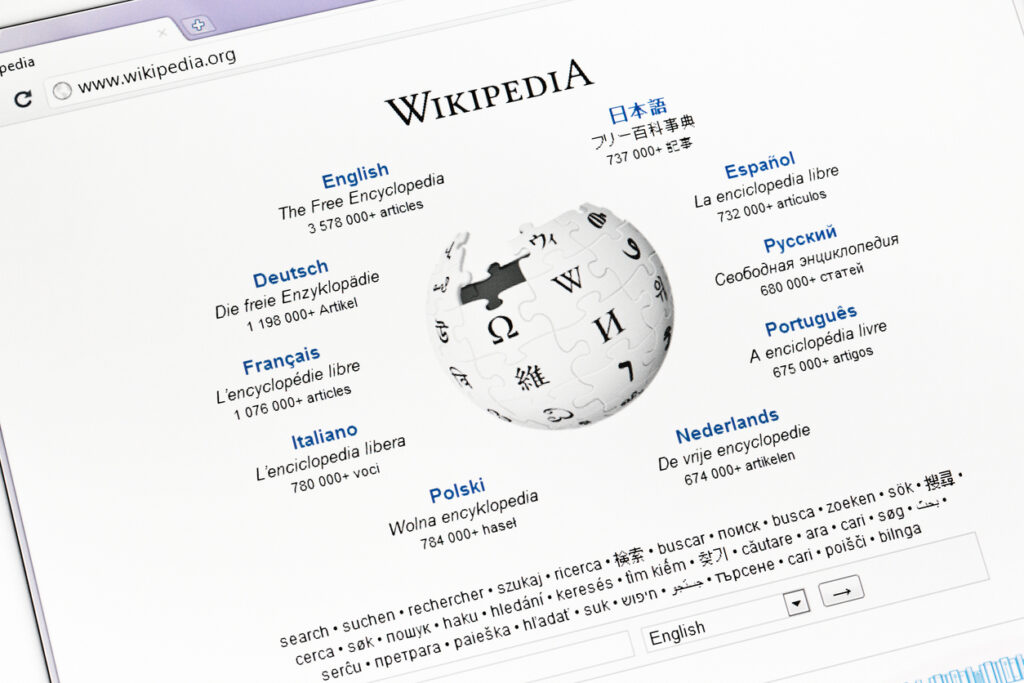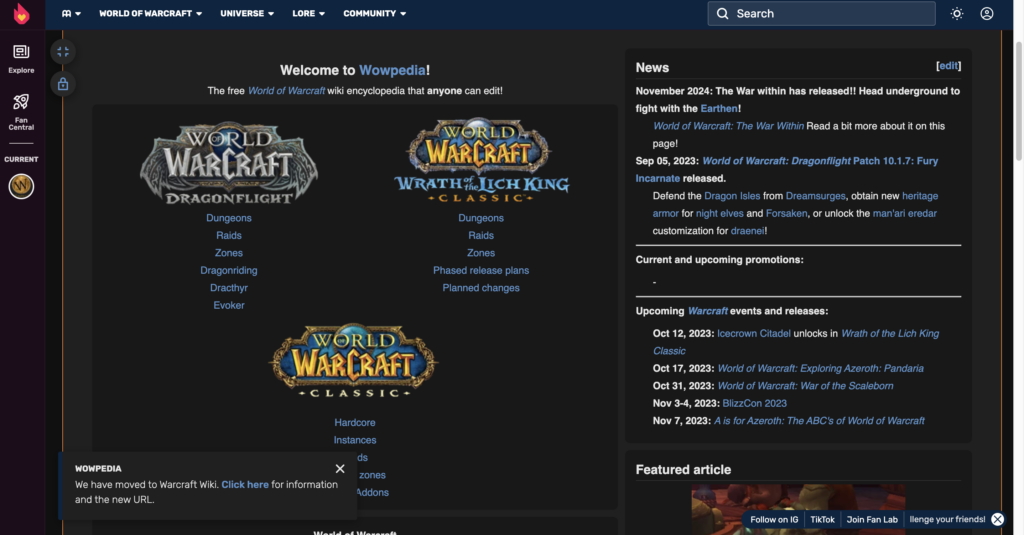What Is a Wiki? Definition, Examples, Use Cases, and Pros & Cons

How fast and easy is it for your employees to collaborate and share knowledge? Whether working in-office, remotely, or in a hybrid setup, co-functioning is vital to problem-solving, generating better outcomes, personal growth and motivation, improved job satisfaction, and less stress. The question is how to make that work efficiently when most teams are separated by distance in some way.
The solution could be a wiki—but what is a wiki? Simply put, a wiki is a web-based platform that enables users to create and modify content collaboratively. Whether an external or internal wiki, this online tool is a quick and easy way for teams to work together and share information on projects without the limitations of meeting in person. Here’s everything you need to know, including this tool’s benefits and potential disadvantages.
What Is a Wiki?
The term ‘wiki’ originated from the Hawaiian language, referring to something that is ‘fast’ or ‘quick.’ In the context of knowledge management, the concept behind a wiki database is similar—it helps your staff and business quickly create, add, edit, and share information on a website. This content can come in various formats, including videos, files, links to other news, images, text, audio, etc.
Thanks to its ease of use and open-editing system, wiki web pages allow team members to hop into the tool and start editing anytime they want. This avenue can be vital in business, particularly because team collaboration fosters innovation and creativity. According to recent studies, collaboration is cited as ‘very important’ by 75% of employees, with 86% reporting a ‘lack of collaboration’ as the leading cause of most workplace failures.
Did You Know? A wiki is one of the many types of knowledge management systems your company can take advantage of to ensure efficient flow and availability of information. It can be a standalone tool for organizations. However, most companies utilize wikis as a significant component of a centralized system.
Types of Wikis: Internal Wiki and External Wiki
Wikis can be classified as internal or external, primarily based on accessibility. An internal wiki is restricted to users within a specific organization or network, often requiring authentication for access, which sets it apart from a traditional knowledge base. It serves as a private repository for organization-specific information, documentation, and collaborative content.
On the other hand, an external wiki is publicly accessible via the internet, allowing anyone to view and, in some cases, contribute to its content. A classic example of this type is Wikipedia.
With these definitions of wikis, a company wiki typically falls under the category of an internal wiki. It facilitates knowledge sharing, collaboration, and documentation within the company’s boundaries, protecting sensitive information and promoting efficient internal communication.
Examples of Wikis
The popularity of public wikis may make it seem like these tools only emerged at the height of internet use. But that’s not the case. Wikis aren’t a new concept in the industry. The very first wiki software was developed between 1994 and 1995 by Ward Cunningham under the name Wiki Wiki Web. Cunningham created it as a component of his Portland Pattern Repository, intended for collaborative software development documentation.
According to some research reports, the inspiration behind the name came from it being “the simplest online database that could possibly work.” Since then, every wiki has been a descendant of this software, demonstrating its foundational influence on collaborative web technologies. Some of the most popular examples of a wiki include the following:
- Wikipedia — This free online encyclopedia allows users to add and edit online content. It is currently the most prominent and most-read wiki in history.
- Wikivoyage — As a sister site to Wikipedia, Wikivoyage is another free web-based platform. However, its content is more geared toward global traveling, including destinations, travel updates, itineraries, etc.
- WikiHow — Users turn to WikiHow for how-to topics and content. The platform encourages worldwide collaboration on every possible topic in a how-to manual.
- Wiktionary — The goal of this wiki example is for every word in every language to be found and defined on the webpage. Since its founding, however, it has gone beyond basic definitions and started including rhyme guides, phrasebooks, a thesaurus, and more.
- Wikispecies — Whether you have a passion for learning about animals or have made a career in zoology or biology, Wikispecies offers an array of information on classifications and other unique details.
- Wikibooks — When you need free, annotated, digital texts, Wikibooks is the platform. It’s an online collaborative book-authoring site that allows anyone to edit and link to a page for resources.
- Wikimedia Commons — A repository of freely usable media files that anyone can contribute to. It includes images, sound files, and video clips.
- OpenStreetMap Wiki – This wiki example supports the OpenStreetMap project, a collaborative, editable world map. It contains documentation, guides, and community information.

As a side note, although many do, not all wikis have the name in their title. This is especially true since the evolution of wikis has seen a significant shift towards niche specialization. While early wiki websites like Wikipedia aimed for broad, general knowledge, there has been a proliferation of wikis dedicated to particular subjects.
For instance, Fandom is a collection of wikis for entertainment-related content. Likewise, Baseball Reference is a wiki for baseball content related to current teams and players, as well as historical stats and scores.
There are even wikis dedicated to specific video game franchises, like “Wowpedia” for the Warcraft universe. They provide exhaustive detail on game lore, characters, and gameplay, creating valuable resources for dedicated fans that far exceed the level of detail on general knowledge sites. This trend reflects the internet’s broader movement toward specialized communities and content catering to various related knowledge types.

Common Use Cases for Wikis
There are many ways businesses and organizations can use wikis. They can serve as dynamic project collaboration spaces or robust internal knowledge bases. You can use a wiki to document and share intricate product specifications across global teams or organize resources and event schedules.
Here are a few examples of specific use cases:
- Blogs and articles hub
- Knowledge base for onboarding materials
- Repository for handbooks and manuals
- Centralized answers to technical issues and questions
- Knowledge-sharing platform with FAQs, how-tos, etc.
- Go-to page for company news and announcements
- Source for process documents
Wikis are versatile tools that can transform internal workflows into an efficient operational cycle and streamline communication to avoid workplace issues. Whether streamlining complex projects, onboarding new hires, or ensuring everyone stays informed, their adaptability makes them invaluable.
How Can Wikis Benefit Your Business?
Implementing a wiki into your business can offer your employees several benefits, especially as a platform where everyone can access and manage the same content in one place. Just as public wikis like Wikipedia create a central repository of information, internal wikis allow companies to consolidate vital knowledge from procedural documentation to project details. This reduces information silos and ensures everyone has access to the same, up-to-date information.
The most significant advantages of internal wiki pages for your company include the following.
1. Makes company knowledge accessible and easier to find
Your company’s collective knowledge is its biggest strategic advantage. A well-structured wiki acts as a primary warehouse of information, ensuring invaluable knowledge remains within the organization, mitigating the risk of information loss due to employee turnover or knowledge silos.
Your company has brought together all the creative and talented minds of its employees, and only you can ensure that those unique insights and knowledge stay with the company. With a wiki, every user can search your database for information they need to do their jobs more efficiently and effectively.
Significant data that supports this benefit can be found in our 2025 report on The Value of Enterprise Intelligence. Our research shows that 98.5% of employees believe better information sharing between departments would significantly increase productivity. This underscores the critical role of accessible, centralized knowledge platforms like wikis in bridging departmental gaps and fostering a more efficient and collaborative work environment.
2. Lowers business costs over time
As productivity increases with quick access to information and innovative ideas added to your wiki, business costs will decrease over time. This is because fewer employees are wasting time searching for information, which research suggests can account for almost 20% of their workweek—and more employees are sharing better approaches to work.
In addition, wikis, along with the other components of a well-designed knowledge management system, address operational areas that ramp up costs, such as time to proficiency for new hires and employee turnover. When information for transitional roles is available, it narrows the gap between the employee’s time dealing with the learning curve during onboarding and the period of uninterrupted productivity.
3. Allows both in-office and remote employees to access the same resources
With an increasing reliance on online and mobile technology, it’s no surprise that almost 20% of employees in the US worked from home in 2023. This data shows how the exclusivity of in-office working has become a thing of the past.
A third option grows increasingly appealing to many companies. According to The 2024 Hybrid Work Trends Report of OfficeRnD, approximately 28.2% of full-time workers have adopted a hybrid work arrangement.
With this level of flexibility in workers’ time and location, you must embrace the same collaborative and knowledge-sharing environment within the organization. To do this, you can use a wiki to create one source for everyone to come together and contribute to, especially when working on cross-functional projects.
Our surveys showed that respondents consistently highlighted that having the right knowledge available when needed empowered them to contribute new ideas and refine current procedures. This access to information is directly correlated with increased confidence and autonomy in their roles.
4. Enhances internal communication and transparency
The fact that teams can collaborate on documents in real-time, track changes, and maintain a single source of truth in an internal wiki builds a transparent environment for employees without barriers to critical data. This accessibility fosters open communication channels.
Employees gain a clearer understanding of company-wide initiatives and departmental activities. In turn, it promotes alignment and reduces misunderstandings rooted in communication issues.
This outcome is supported by Gallup’s research, which consistently emphasizes the link between communication and employee engagement. Their 2024 State of the Global Report indicates that engaged employees with strong communication with their managers and peers are significantly more productive and less likely to leave their jobs.
5. Promotes version control to track content freshness
Ever tried finding the most recent company policy only to stumble upon a document last updated during the Jurassic Era? A wiki solves this digital dinosaur problem through transparent version control.
Every edit is tracked, creating a clear history of changes and allowing users to revert to previous versions if needed. Wikis also empower collaborative content creation without the chaos of multiple document versions floating around. Teams work together seamlessly, with the wiki automatically tracking contributions and changes. This transparency promotes accountability and ensures everyone operates with the same information.
What Are the Disadvantages of Wikis?
Even the shiniest digital tools have quirks, and corporate wikis are no exception. Some notable disadvantages of a corporate wiki are worth keeping in mind as you decide what kind of knowledge management solution is best for your business. These drawbacks include the following:
1. Open to all for editing
While being open for all to edit can create an innovative and creative space for users to collaborate, it can also cause problems if important information is deleted and/or replaced with incorrect edits. As the saying goes, there are too many cooks in the kitchen.
When too many editors dig into a piece, it can disrupt the flow of content and risk the loss of valuable information. It can also result in fragmented information, conflicting viewpoints, and a lack of standardized formatting, making it difficult for employees to find reliable and up-to-date information.
2. Extensive user rights management
What comes across as an advantage of wikis is also a disadvantage because there’s no real management of users and their content distribution. Anyone can add anything, anywhere.
This can get dangerous in the workplace if you’re not extensively managing user rights because erroneous information can be shared. Suppose this happens in a scenario related to customers, for instance. In that case, you may see team members approaching a customer problem or question inappropriately, possibly harming your business reputation or even losing that customer.
3. Maintaining information authenticity
The authenticity of the information in your wiki is crucial to its success and your company’s growth. The whole point of a knowledge base is to accumulate all the knowledge types coming into your organization and share it with your employees so they can make improvements and work more efficiently.
However, if that knowledge is not authentic and accurate, it can do the opposite. After all, if the knowledge being shared isn’t correct, what’s the point of sharing it? An inaccurate knowledge base wastes time and resources, as employees rely on flawed information, ultimately hindering productivity rather than enhancing it.
4. Information overload and disorganization
Company wikis, intended to centralize knowledge, often contribute to information overload and disorganization when not properly managed. The ease of content creation and editing can lead to an unchecked proliferation of articles, documents, and updates, making it challenging to sift through relevant information.
Without strict guidelines for content organization, tagging, and categorization, users struggle to find what they need, resulting in frustration and decreased productivity. This issue worsens when multiple users contribute without a unified structure, creating a chaotic repository where redundant, outdated, and trivial (ROT) information or data overshadows valuable knowledge.
A Fitting Alternative to Wikis
Wikis offer many of the same benefits of a knowledge base by allowing you to take charge and nurture your organization’s collective insight and skill. However, wikis may have some limitations, especially when keeping information accurate and up to date.
Even worse, the advantages of wikis can be turned into their pitfalls if the organization lacks a systematic approach to maintenance and governance. For this reason, turning to a more robust solution that encapsulates the wiki benefits and adds layers of knowledge management advantages is the best way to go.
A knowledge management solution like Bloomfire is a modern alternative to using wikis. It has a better design for intuitive user experience, making it easier to update content, and has moderation tools to ensure information is approved and has better engagement analytics. This means you can still get the same collaborative space for team members to complete projects and share their knowledge without the risk of information being distorted or misrepresented in your database.
Is a Wiki the Right Choice for Your Business?
The allure of a wiki lies in its open, collaborative design, particularly for rapid content development and community-driven knowledge. However, for businesses needing strict oversight, robust analytics, and a structured information framework, a comprehensive knowledge management platform like Bloomfire proves more beneficial. It delivers enhanced security measures, detailed analytical insights, and a more organized, easily searchable knowledge repository.
Note: This blog post was originally published in December 2022. It was most recently expanded and updated in April 2025.
Better Than a Company Wiki
Learn why a KM solution triumphs over a traditional wiki from a KM expert.
Schedule a Consultation

7 Proven Strategies on How to Improve Collaboration in an Organization

The Importance of Knowledge Management in Banking

Start working smarter with Bloomfire
See how Bloomfire helps companies find information, create insights, and maximize value of their most important knowledge.

Take a self guided Tour
See Bloomfire in action across several potential configurations. Imagine the potential of your team when they stop searching and start finding critical knowledge.
